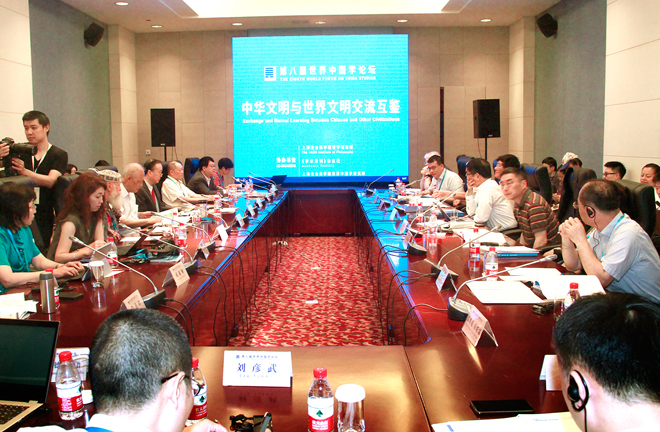8th World Forum on China Studies concludes

A session of the Eighth World Forum on China Studies Photo: Zha Jianguo/CSST
SHANGHAI—The eighth edition of the World Forum on China Studies, a biennial event for the worldwide community of China studies to share research achievements and boost academic ties, took place Sept. 10 to 11 in Shanghai.
Themed “China and the World: A Journey of 70 Years,” the event was held to coincide with the 70th anniversary of the People’s Republic of China to better depict the ties between China and the world, attracting more than 300 experts and scholars from 35 countries and international organizations.
Huang Kunming, a member of the Political Bureau of the CPC Central Committee and head of the Publicity Department of the CPC Central Committee, delivered a keynote speech at the opening ceremony.
China has provided a strong driving force to the development of the world economy and contributed Chinese wisdom to the people of all countries in pursuing a better life, Huang said, noting that China has continued its efforts to safeguard world peace, contribute to global development and uphold international order.
The world is facing unprecedented changes, and humanity is facing common risks and challenges, said Huang, who insisted that between civilizations, misunderstandings should be transcended by exchange, conflicts should be transcended by mutual learning, and exceptionalism should be transcended by coexistence. He also called for building platforms for more exchanges as well as carrying out dialogue for more equality and mutual trust.
Huang expressed the hope that the forum will provide international scholars who specialize in China a platform to share their insights, explore how the country is connected with the world and convey the significance of its development to the world.
Li Qiang, a member of the Political Bureau of the CPC Central Committee and secretary of the CPC Shanghai Municipal Committee, attended the forum and made remarks.
It is necessary to understand the history of China over the past seven decades and unlock China’s development miracle, said Bert Hofman, director of the East Asian Institute at the National University of Singapore. In China’s continuous reform, change in state-owned enterprise reform, the development of the market economy and the improvement of macro management are crucial.
At the same time, Hofman said that China attaches great importance to integrating into the world and learning from other countries. China’s accession to the WTO in 2001 ushered in a new era for rapid economic growth. China’s development has provided new choices to countries and nations in the world who hope to accelerate development while maintaining their independence, and it has also contributed Chinese wisdom and solutions to problems faced by humanity.
Fan Gang, a professor at Peking University, said that China’s development over the past 70 years has not only been manifested in GDP growth, but also accompanied by significant institutional evolution and its people’s all-around development. In the past 20 years, China has grasped opportunities of knowledge and technological progress and learned from developments in human knowledge, including science, technology, social science and institutional knowledge, promoting advances in various undertakings. In the future, China should focus more on innovation, continuously narrowing its gap with developed countries in terms of originality.
As a responsible major country, China is committed to providing effective public goods for global development. Vincent Koen, OECD’s head of division, said that China’s Belt and Road (B&R) initiative has received international attention. Starting from China, it connects the Indian Ocean and Africa and is of great significance to the infrastructure construction in these areas. In China, the B&R runs through the eastern, central and western regions, and it can better address the imbalance of regional development.
China not only follows the international order, but is also a responsible actor, said Khalid Mahmoud, Pakistan’s former ambassador to China. The B&R initiative has opened up many areas and new communication channels. With the B&R initiative and the construction of the China-Pakistan Economic Corridor, China is not only developing its own economy but also helping other countries develop their economies. Countries along the B&R including Pakistan have gained economic vitality because of these projects. China’s own development and its commitment to the international community have created and will continue to create mutual benefit.
edited by JIANG HONG

 PRINT
PRINT CLOSE
CLOSE